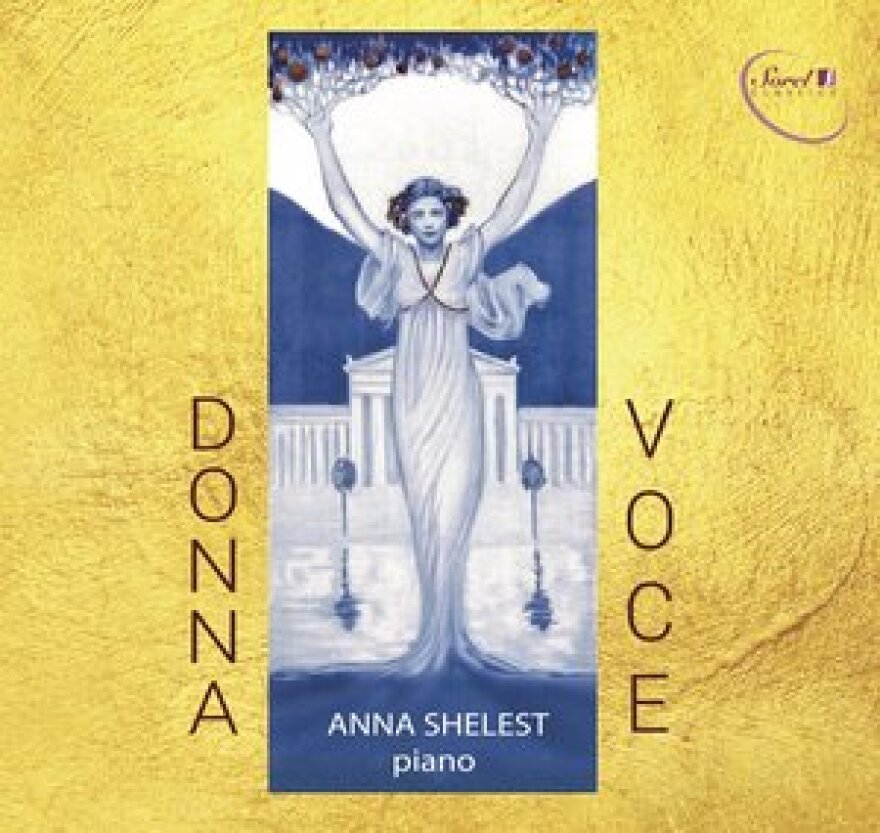There was a time when a woman composer was a relatively rare phenomenon. There was also a time when music critics drew a clear line between "masculine" (read: strong, powerful, large) music and "feminine" (read: gentle, sweet, small) music.
If the Ukranian-born pianist Anna Shelest had lived during that time, her new recording of solo piano music by women composers would not have come to fruition and, thus, would not have been able to showcase women's music in its own power.
Good thing we live in the now.
As the recording's title suggests, Donna Voce (Sorel Classics) gives voice to piano music by some of the world’s foremost women composers – Fanny Mendelssohn, Amy Beach, Cécile Chaminade, Lili Boulanger and contemporary composer Chia-Yu Hsu.
If you’ve never heard of these composers, that could be because all of them remain eclipsed by and still largely excluded from the classical music canon – the repository of what is considered to be "standard repertory," music that most often gets performed on concerts and featured on recordings.
Scan the list of composers represented in the classical music canon and you'll see far more men's names than women's names. Even so, it has been difficult enough for male composers to compete with, say, Beethoven or Brahms. But women composers? Heaven help us.
For these reasons, Donna Voce is a fiercely important recording, showcasing as it does gems by women composers that tradition and time have pushed into relative obscurity.
Until recently, this repertoire was even obscure to Shelest, a woman pianist with an international performing career and a significant and growing discography.
"This whole album – everything was new to me, was kind of like having (a) master class with all these great women,"said Shelest in a recent phone interview.
Four of the six composers represented on Donna Voce – Mendelssohn, Beach, Schumann and Chaminade – had been virtuoso pianists during the 1800s and early 1900s, concertizing as soloists at a time when the world had other expectations of women.
Shelest says it was eye-opening to experience through her fingertips how the pianistic dimension shines through in the music these women wrote.
"I noticed that I gravitated to compositions by composers who were virtuoso pianists,"Shelest said, "I think because it just feels so wonderful in your fingers."
https://www.youtube.com/watch?v=F0aEhYy-lX8
Above: Anna Shelest performs Clara Schumann's Scherso, Op. 14, one of the works on Shelest's most recent recording, 'Donna Voce.'
Musical virtuosity has historically been associated with masculinity, and "virtuosic" joins "powerful" and "strong" as descriptors for music that has been considered "masculine."
Shelest cracks this glass ceiling, too, by bringing her own experience performing the "big" Russian virtuoso piano works to bear in her interpretations of the virtuosic music of the women composers represented on Donna Voce.
"The first piece on the album, (Fanny Mendelssohn’s) piano sonata, is wonderful, a very dramatic, very virtuoso work," Shelest said. "I was very surprised by its drama and intensity, so it was actually something I didn't expect from her, but I really love that element. So I think perhaps some pieces come across as strong, and I wasn't doing it on purpose, I think. But perhaps my upbringing as a pianist – I played a lot of big Russian pieces and concertos growing up – so I think that they probably also had to do with my take on this music."

And although the virtuosic music on Donna Voce is performed less often than the standard repertoire, that dark reality, Shelest discovered, is also a silver lining – this music is not burdened by the baggage of how it has been interpreted in the past.
"There's no performing tradition of these pieces, for this repertoire," Shelest said. "So this was kind of fun as a performer, because you’re always aware, when you play standard repertoire, that there were great artists before you who played it. And in this area of music, of course, there are performers who played this music before, but it’s not like there are expectations of how you should play Clara Schumann or Cecile Chaminade. You sort of make it up as you go. So I really thought it was a very freeing and adventurous aspect of preparation for this program."



